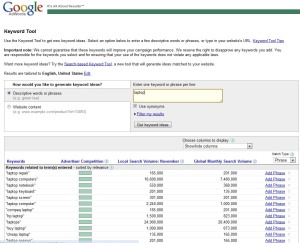It’s a given to talk about keyword match types in PPC (especially Adwords), but very few people seem to talk about the meaning of keyword match types in SEO. I want to do exactly that, because it’s just as important. In PPC, manipulating the match types is an important strategy that can save your budget, perfect the CTR and quality score, and even increase the conversions (by focusing on more targeted keywords).
But what does keyword match type have to do with SEO? A random introduction to search engine optimization tells us to look up the traffic numbers in a keyword tool regardless of the match type (it’s broad by default) and use it as a guide. More attention is drawn to the competition, however, even though in SEO we don’t pay per click, we spend long hours optimizing our pages and building links. That’s an investment to be regarded as such!
 How many times have you followed the traffic numbers suggested by a keyword tool, worked hard to get to page one on Google only to see there’s nowhere near the traffic you’ve expected to see? Most of the time this happens due to not paying attention to the keyword match type you’ve based your SEO on (other times it’s because of data errors – the tools aren’t perfect).
How many times have you followed the traffic numbers suggested by a keyword tool, worked hard to get to page one on Google only to see there’s nowhere near the traffic you’ve expected to see? Most of the time this happens due to not paying attention to the keyword match type you’ve based your SEO on (other times it’s because of data errors – the tools aren’t perfect).
You have to realize one thing first, Google’s Keyword Tool (and all other tools based on it) is made for PPC advertisers and therefore it is designed to suit their needs. The broad match type which you get by default is not what you will get from people typing in the keyword in Google, it’s the traffic from a whole bunch of keywords that Google considers relevant. That traffic is only available to PPC advertisers, so it makes no sense whatsoever to use that data for your SEO.
The phrase match is closer to what we need, but it’s still far from accurate. This match will provide the traffic from all keywords that have the key phrase in them, but again, only for PPC advertisers. In SEO you will have to work on all keywords that meet the criteria in order to get all the traffic from phrase match. Sure, you will get a few such keywords automatically as you are likely to rank for related terms too, but it is impossible to tell for how many (if at all) of them you will rank.
That leaves us with the exact match, which makes most sense to use in estimating SEO traffic. It may seem common sense, but many marketers will mistakenly settle with other match types and will be very disappointed when they don’t get the expected results. It’s better to be conservative and underestimate the results than to be overly optimistic and overestimate them!
But other than the exact match, other match types can’t be useless, can they? Of course not, and here’s how we can use them for our SEO projects:
- Broad match indicates the overall market size, and it’s useful in niche research to identify the size of a niche.
- Phrase to broad match ratio tells us a little bit about how much unrelated traffic some niche keywords may have (for example, keyword “bull” will match the animal, financial term, the energy drink and so on – but only one of them may be your niche).
- Phrase to exact match ratio is perhaps the most interesting indicator. It shows us the segmentation of our target market and the intent of the searchers. In most cases, it’s common sense to know what they want if we know our target market (for example we know that the keyword “laptop” will have big phrase matches for “laptop battery”, “laptop bag” and so on), but this is the cold hard data that tells us what is important in our niche and what’s not, what categories to use and so on.
- Keyword trend is not a match type but it’s an important indicator too. Some keywords are seasonal or fad keywords which have high peeks at some point in time that skews the average data significantly. It’s a good idea to check your target keywords in Insights for Search for those cases, as well as to see where your niche is heading.
To recap, the exact match is the number one thing to look at when estimating SEO traffic. In addition to that, other keyword match types tell us a lot about our target market and its intent, but they have less to do with the actual traffic we will get.
Finally, I’ll end the post with another important aspect of keyword traffic research. The numbers provided by Google Keyword Tool are amounts of searches per month, to estimate the monthly visits you can expect from various positions, you have to adjust the numbers by the position on the SERPs:
| Position | % of searches |
|---|---|
| 1 | 42.3% |
| 2 | 11.92% |
| 3 | 8.44% |
| 4 | 6.03% |
| 5 | 4.86% |
| 6 | 3.99% |
| 7 | 3.37% |
| 8 | 2.98% |
| 9 | 2.83% |
| 10 | 2.97% |
Source of this table: pagetrafficblog.com
That concludes this post, I hope you can take something from it with you.

This is a great post! Where are the other comments?
Thanks
No-one’s posted them 😉
Doing keyword research for my company, thought that matching types had to be important for SEO, then typed “keyword match types SEO” on google, and here I landed. Great article, will share it.
Very good article, informative!
Thanx for sharing:)
Petter
Great article indeed. I really don’t like it when so called “SEO Experts” use google keyword selector for selecting keywords because as you said it, it is made for PPC advertisers.
Thanks for writing stuff that will help me to get better on seo. Google keyword tool is a great help in my work but as you pointed its for ppc. But still very helpful. //Elina
Great article but at the end you say “The numbers provided by Google Keyword Tool are amounts of searches per day”. But then why do they label it as monthly search?
Oh dear goodness, it’s supposed to say searches per month, of course. I can’t believe the mistake was there for all this time.
Thanks the heads up!
I have recently wondered how the broad match counts could relate to SEO. If Google has algorithms to find synonyms and related words when doing keyword research, I wonder if any of this gets applied to organic rankings as well. Clearly this would cause some relevancy issues in many cases, but it is also known that a page can rank for a term that isn’t even present because of other factors such as linking, etc. Anyway, just a random thought, I figured I would share.